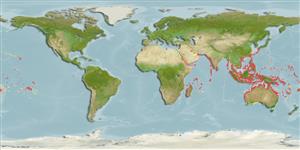Common names from other countries
>
Eupercaria/misc (Various families in series Eupercaria) >
Labridae (Wrasses) > Corinae
Etymology: Thalassoma: Greek, thalassa = the sea + Greek, soma = body; the colour of the sea (Ref. 45335).
More on author: Linnaeus.
Environment: milieu / climate zone / depth range / distribution range
البيئة
بحري مرتبطة بالشعاب; نطاق العمق 1 - 20 m (Ref. 9823), usually 1 - 20 m (Ref. 27115). Subtropical; 24°C - 28°C (Ref. 27115); 32°N - 36°S, 24°E - 136°W
Indo-Pacific: Red Sea and East Africa (Ref. 4392) to the Line Islands, north to southern Japan, south to Lord Howe Island and northern New Zealand (Ref. 1602). Reported to have formed a hybrid with Thalassoma rueppellii (Ref. 41655).
الحجم / وزن / العمر
Maturity: Lm ? range ? - ? cm
Max length : 45.0 cm TL ذكر/ مختلط الجنس; (Ref. 5450)
الأشواك الظهرية (المجموع) : 8; الأشعة الظهرية الناعمة (المجموع) : 13; شوكة شرجية: 3; أشعه شرجية لينه: 11. Adults are identified by the yellow lunate tail. Large males turn blue on the head that grades to green towards the tail (Ref. 48636). Body dark green to blue with vertical red to purplish red lines. Head green to blue with irregular pink to violet bands. Adults with large yellow crescent posteriorly in caudal fin and blue pectoral fins with a large elongate pink area distally. Juveniles with a large dark spot in middle of dorsal fin and a large diffuse black spot at base of caudal fin (Ref 9823).
Occurs solitary or in groups (Ref. 90102) in the upper portions of lagoon and coastal reefs, and in protected seaward reefs (Ref. 1602). Enters estuaries (Ref. 48636). Usually found on upper portions of ledges and heads (Ref. 9710). Feeds mainly on small benthic invertebrates and fish eggs (Ref. 9823). A protogynous hermaphrodite (Ref. 55367).
Life cycle and mating behavior
Maturities | التكاثر | Spawnings | Egg(s) | Fecundities | Larvae
A diandric species (Ref. 55367). Length at sex change = 11.0 cm TL, forms leks during breeding (Ref. 55367).
Randall, J.E., G.R. Allen and R.C. Steene, 1990. Fishes of the Great Barrier Reef and Coral Sea. University of Hawaii Press, Honolulu, Hawaii. 506 p. (Ref. 2334)
IUCN Red List Status (Ref. 130435)
CITES (Ref. 128078)
Not Evaluated
استخدامات بشرية
مصائد: غير مهمة تجارياً; حوض مائي: تجاري
أدوات
تقارير خاصة
Download XML
مصادر علي الأنترنت
Estimates based on models
Preferred temperature (Ref.
115969): 24.6 - 29, mean 28 (based on 1296 cells).
Phylogenetic diversity index (Ref.
82804): PD
50 = 0.5000 [Uniqueness, from 0.5 = low to 2.0 = high].
Bayesian length-weight: a=0.01230 (0.00793 - 0.01909), b=2.97 (2.85 - 3.09), in cm Total Length, based on LWR estimates for this species & Genus-body shape (Ref.
93245).
مستوى غذائي (Ref.
69278): 4.2 ±0.27 se; based on food items.
المرونه (Ref.
120179): وسيط, الحد الزمني الأدني لتضاعف عدد أفراد المجتمع 1.4-4.4 سنة (Preliminary K or Fecundity.).
Fishing Vulnerability (Ref.
59153): Low to moderate vulnerability (35 of 100).
